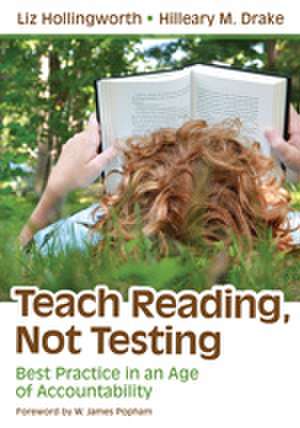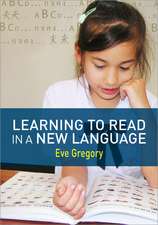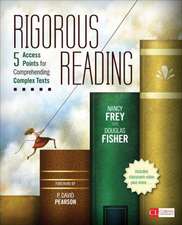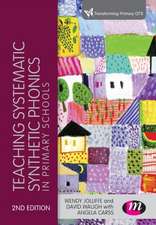Teach Reading, Not Testing: Best Practice in an Age of Accountability
Autor Liz Hollingworth, Hilleary M. Drakeen Limba Engleză Paperback – 9 ian 2012
Preț: 224.69 lei
Nou
Puncte Express: 337
Preț estimativ în valută:
43.00€ • 44.73$ • 35.50£
43.00€ • 44.73$ • 35.50£
Carte tipărită la comandă
Livrare economică 14-28 aprilie
Preluare comenzi: 021 569.72.76
Specificații
ISBN-13: 9781412997737
ISBN-10: 1412997739
Pagini: 144
Dimensiuni: 178 x 254 x 13 mm
Greutate: 0.3 kg
Ediția:1
Editura: SAGE Publications
Colecția Corwin
Locul publicării:Thousand Oaks, United States
ISBN-10: 1412997739
Pagini: 144
Dimensiuni: 178 x 254 x 13 mm
Greutate: 0.3 kg
Ediția:1
Editura: SAGE Publications
Colecția Corwin
Locul publicării:Thousand Oaks, United States
Recenzii
"This timely book addresses issues that we all deal with on a daily basis because of NCLB and high stakes testing. Teachers are in a quandary because they are often directed to provide exercises and activities in the classroom that contradict what they know to be good literacy instruction. This book provides suggestions for maintaining excellent instructional standards which will result in improved test scores."
"This is a useful resource for teachers and administrators who aspire to ramp up their knowledge of current practices and policies driving the myriad changes swirling in the field of literacy instruction. It is a friendly overview and navigation guide by a knowledgeable author team."
"This is a useful resource for teachers and administrators who aspire to ramp up their knowledge of current practices and policies driving the myriad changes swirling in the field of literacy instruction. It is a friendly overview and navigation guide by a knowledgeable author team."
Cuprins
Foreword by W. James Popham
Acknowledgments
About the Authors
Introduction
1. Conducting an Alignment Study
Conducting an Alignment Study
What Is Alignment?
Teaching to the Test: Just Say No
Key Points to Remember
End-of-Chapter Quiz
2. Using Formative Assessments
What Does Formative Mean?
How Are the Scores of Test Takers Analyzed?
Differentiated Instruction
Tests as a Snap Shot: The Jacuzzi Metaphor
DIBELS
Test Quality and District Assessments
End-of-Chapter Quiz
3. Struggling Readers
Accommodations Versus Modifications
Modifications and High-Stakes Tests: Alternative Assessments
Accommodations and High-Stakes Tests
Assistive Technology (AT)
Response to Intervention (RTI)
Differentiated Instruction (DI)
English Language Learners (ELLs)
End-of-Chapter Quiz
4. Attitude and Motivation
Motivation Research
Incentives
Goal Setting
What to Do If Your Principal Wants to Use Pizza Parties to Bribe Students
The Use of Practice Tests: Preparation or Motivation?
Test Preparation: Analyzing Tests as a Reading Genre
Communicaton With Stakeholders
End-of-Chapter Quiz
5. Engaged Independent Reading
Connect Your Reading Units to Real-World Contexts
Teaching Students to Read for Pleasure
Reading at Home: W.E.I.R.D.
What's the Deal With Boys?
Literature Circles and Book Clubs: What Is Normal in the Real World?
Best Practice for Book Clubs
Summary
End-of-Chapter Quiz
6. Best Practice
What Do Quality Inservices Look Like?
Theory and Practice at the Elementary Level: Best Practices Primer
Know What Works for You
End-of-Chapter Quiz
7. Implications for Your Teaching and Beyond
Holding Your Ground
Test Misuse in the Early Days of Testing
The Need for a Supportive Principal
No More Teaching to the Test
Next Steps
Final Thoughts
Resource A: Answers to Quizzes
Resource B: Five Ways to Teach Vocabulary
General Glossary of Assessment Terms
References
Index
Acknowledgments
About the Authors
Introduction
1. Conducting an Alignment Study
Conducting an Alignment Study
What Is Alignment?
Teaching to the Test: Just Say No
Key Points to Remember
End-of-Chapter Quiz
2. Using Formative Assessments
What Does Formative Mean?
How Are the Scores of Test Takers Analyzed?
Differentiated Instruction
Tests as a Snap Shot: The Jacuzzi Metaphor
DIBELS
Test Quality and District Assessments
End-of-Chapter Quiz
3. Struggling Readers
Accommodations Versus Modifications
Modifications and High-Stakes Tests: Alternative Assessments
Accommodations and High-Stakes Tests
Assistive Technology (AT)
Response to Intervention (RTI)
Differentiated Instruction (DI)
English Language Learners (ELLs)
End-of-Chapter Quiz
4. Attitude and Motivation
Motivation Research
Incentives
Goal Setting
What to Do If Your Principal Wants to Use Pizza Parties to Bribe Students
The Use of Practice Tests: Preparation or Motivation?
Test Preparation: Analyzing Tests as a Reading Genre
Communicaton With Stakeholders
End-of-Chapter Quiz
5. Engaged Independent Reading
Connect Your Reading Units to Real-World Contexts
Teaching Students to Read for Pleasure
Reading at Home: W.E.I.R.D.
What's the Deal With Boys?
Literature Circles and Book Clubs: What Is Normal in the Real World?
Best Practice for Book Clubs
Summary
End-of-Chapter Quiz
6. Best Practice
What Do Quality Inservices Look Like?
Theory and Practice at the Elementary Level: Best Practices Primer
Know What Works for You
End-of-Chapter Quiz
7. Implications for Your Teaching and Beyond
Holding Your Ground
Test Misuse in the Early Days of Testing
The Need for a Supportive Principal
No More Teaching to the Test
Next Steps
Final Thoughts
Resource A: Answers to Quizzes
Resource B: Five Ways to Teach Vocabulary
General Glossary of Assessment Terms
References
Index
Notă biografică
Liz Hollingworth is a professor in the College of Education at the University of Iowa. Her research and teaching interests are centered on curriculum, leadership, and assessment. In particular, her work explores how federal school reform policies affect classroom practice. Her other books include Organization and Administration of Iowa Public and Private Schools and Complicated Conversations: Race and Ideology in an Elementary Classroom. Dr. Hollingworth grew up in San Diego, taught in Chicago and Michigan, and now lives in Iowa City with her husband, Andrew, and teenaged daughter, Emily.
Descriere
The authors provide a reasonable and even-handed methodology for teaching reading to K-12 students. Instead of focusing on worksheets and drills, their research-based approach shows teachers how to align instruction with standards, use formative assessment, motivate students, and use best practices in literacy instruction for successful outcomes.





